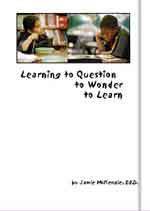If reality never lives up to our expectations, must we enhance it?
What are the implications for schools and learning?
Media Literacy Takes on New Urgency
When so-called "reality TV" and various news magazines shove real news programs into the background, and when those "real" news programs spend more time on Michael Jackson's trial and Terry Sciavo's fate than on budget deficits or the debate over Social Security, how do we maintain an educated citizenry?
When the important issues of our day fade into the background as scandals and tabloid stories dominate the coverage, how can schools counter the cultural drift?
Ego-Casting, Body Snatching and Pay for Press Converge
Coining the term "ego-casting" in her New Atlantic article, "The Age of Egocasting" Christine Rosen identifies a chilling trend: new technologies are capable of giving us just the information we want while screening out that which might frighten, disturb, irritate (or illuminate.)
- By giving us the illusion of perfect control, these technologies risk making us incapable of ever being surprised. They encourage not the cultivation of taste, but the numbing repetition of fetish. And they contribute to what might be called “egocasting,” the thoroughly personalized and extremely narrow pursuit of one’s personal taste. In thrall to our own little technologically constructed worlds, we are, ironically, finding it increasingly difficult to appreciate genuine individuality.
- http://www.thenewatlantis.com/index.html
According to this view, new technologies may insulate and enslave rather than educate or enlighten.
Knowbots and intelligent agents circle wagons around us, narrow our view and reinforce our prejudices, our preconceptions and our presumptions.
Prospects for Healing
Open-mindedness?
Tolerance?
The possibilities seem threatened by these trends. Is taking time to consider opposing views too tiring and too troubling for this society? Must we shun moderation and thoughtful discourse in favor of scream and shout TV?
In a culture that celebrates make-up and cover-up, reality is often too harsh to handle, verity too gritty, the message too bitter a pill to swallow. Politicians pander to a public that sometimes prefers fantasy over truth.
Rewriting the Present
Totalitarian regimes have stooped to rewriting history so young ones will learn only those aspects of the past that are pleasing to those in power. Young Chinese will find little about the Tiananmen Square brutalities in their textbooks, no pictures of young Chinese standing in front of tanks. (Click here for BBC News coverage and photographs.)
We expect totalitarian regimes to suppress the truth or create substitutes, but it is troubling when contemporary media alter current coverage in ways that rewrite the present before its pages have had a chance to age.
By pointing its cameras at some stories, ignoring others and riding in approved vehicles, the media delivers a version of the present that is severely distorted.
The implications for a democratic society are enormous.
Finding and Interpreting the Un-Storied Present
It might be too much to expect that social studies and English teachers might risk the challenge of equipping students with the skills of ferreting out the uncovered stories, the neglected news angles and the dark side of this media trend.
While citizenship education ought to include a heavy dose of media literacy, the current political climate in the United States is so polarized that it might prove too risky to engage students in a careful analysis of how the press distorts the present.
The polarization is so intense that each side claims the other is getting preferential treatment.
Some argue that coverage in the USA is heavily dominated by what they call "The LIberal Press." They point to articles in the New York Times as evidence - the October 17, 2004 "Without a Doubt" by Ron Suskin published shortly before the presidental election exploring the notion that President Bush was practicing "faith-based" leadership. They complain that it was much more critical in tone and comment than the Times article on John Kerry.
Others argue that consolidation of media ownership has produced a stream of right wing news coverage that is pro-Bush and pro-war, pointing at Rupert Murdoch-owned Fox News as a prime offender.
Looking for the News
Perhaps the solution to this quandary is a classroom focus on finding the real news of the day - the facts, the authentic images and the true stories of what is happening. A positive focus on the search for real news will prove less controversial that a search for bias and distortion, and it is essentially the real task at hand.

